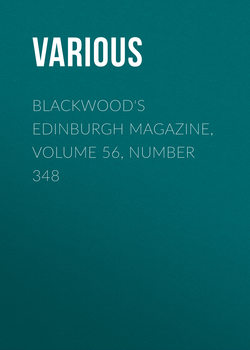Blackwood's Edinburgh Magazine, Volume 56, Number 348

Реклама. ООО «ЛитРес», ИНН: 7719571260.
Оглавление
Various. Blackwood's Edinburgh Magazine, Volume 56, Number 348
THE LIFE OF A DIPLOMATIST.1
POEMS AND BALLADS OF GOETHE
No. II
Cupid As a Landscape Painter
The Artist’s Morning Song
The God and the Bayaderé. An Indian Legend
The Treasure-seeker
The Castle on the Mountain
Philine’s Song
To my Mistress
The Wild Rose
A Night Thought
Prometheus
New Love, New Life
Separation
The Magician’s Apprentice
THE GREAT DROUGHT
Chapter II
Chapter III
Chapter IV
Chapter V
Chapter VI
A TENDER CONSCIENCE
The Controversy
THIERRY’S HISTORY OF THE GAULS.4
THE WITCHFINDER
Conclusion
MY LAST COURTSHIP; OR, LIFE IN LOUISIANA
Chapter the First. A Voyage on the Red River
Chapter the Second. Creole Life
Chapter the Third. Quite Unexpected
GREECE UNDER THE ROMANS.5
Отрывок из книги
Goethe’s love for the Fine Arts amounted almost to a passion. In his earlier years, he performed the painter’s customary pilgrimage through Italy, and not merely surveyed, but studied with intense anxiety, the works of the great modern masters. A poet, if he understands the theory of his own calling, may learn much from pictures; for the analogy between the sister arts is very strong. The secret of preserving richness without glare, fulness without pruriency, and strength without exaggeration, must be attained alike by poet and painter, before either of them can take their rank among the chosen children of immortality. It is a common but most erroneous idea, that an artist is more indebted for success to inspiration, than to severe study. Unquestionably he must possess some portion of the former—that is, he must have within him the power to imagine and to create; for if he has not that, the fundamental faculty is wanting. But how different are the crude shapeless fancies, how meagre and uncertain the outlines of the mental sketch, from the warm, vivid, and glowing perfection of the matured and finished work! It is in the strange and indescribable process of moulding the rude idea, of giving due proportion to each individual part, and combining the whole into symmetry, that the test of excellence lies. There inspiration will help but little; and labour, the common doom of man in the loftiest as well as the lowest walks of life, is requisite to consummate the triumph.
No man better understood, or more thoroughly acted upon the knowledge of this analogy, than Goethe. He wrought rigidly by the rule of the artist. Not one poem, however trifling might be the subject, did he suffer to escape from his hands, until it had received the final touches, and undergone the most thorough revision. So far did he carry this principle, that many of his lesser works seem absolutely mere transcripts or descriptions of pictures, where the sentiment is rather inferred than expressed; and in some, for example that which we are about to quote, he even brings before the reader what may be called the process of mental painting.
.....
“How, Paulett?”
“I can’t explain it to you; but it has just crossed my mind that it is possible; and if so, there are still plenty of jewels in the world to keep us alive.”
.....